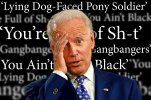army judge
Super Moderator


My blood is still boiling over President Biden's recent insulting comments about Blacks.
While his comments didn't grab many headlines, on the radio program I co-host (on WMAL-DC), we couldn't let it pass.
Unlike other gaffes revealing the president's waning mental capacities, this time the president touted tired, insulting, and false stereotypes about Black families.
Once again, President Biden telegraphed his bigoted views about Blacks to those willing to listen.
During an interview on a Milwaukee radio station recently, President Biden said:
"How many Black communities are in a situation where they come from a circumstance where they're in difficult, where they have difficulty? . . . Even those families that are really poor don't have any books in the house. The kids don't hear a whole lot of conversation."
President Biden assumes that poor Blacks don't have books in their homes, and adults are not speaking enough in their own households for their children to hear and develop language skills.
How did the president get away with using insulting tropes about the intellect of Blacks? Easy. Time and time again he expressed similar sentiments and got a pass.
When asked in 2019 about remedying the impacts of slavery — a question based on a faulty premise to start — then-presidential candidate Biden said parents should "Play the radio."
He added that "a kid coming from a very poor school — a very poor background will hear 4 million words fewer spoken by the time we get there."
Such word gap statistics have been debunked.
In 2020, Biden told a group of Black mayors that the problem in the Black community was that "parents can't read or write themselves."
And let's not forget that in 2019 at a town hall hosted by the Asian and Latino coalition, he told the crowd that "poor kids are just as bright and just as talented as white kids."
He quickly corrected his Freudian slip.
Back in 2007, Biden said of his soon-to-be boss Barack Obama, " . . . you got the first mainstream African-American who is articulate and bright and clean and a nice-looking guy," adding "I mean, that's a storybook, man."
The list goes on.
Here's what's wrong with Biden's thinking about people in poverty and Blacks in poverty. He makes broad generalizations that are either untrue or outdated.
Let's take literacy rates, for example.
Some 8.1% of U.S. adults are functionally illiterate, according to data from the Department of Education.
These individuals lack the English literacy skills to engage in society. The largest demographic of adults with low levels of English proficiency are white (35%) and Hispanic adults (34%).
Black adults comprise slightly less than a quarter of illiterate adults.
Even considering nativity, the largest percentage of those with low literacy skills are white, U.S.-born adults, followed by foreign-born Hispanic adults.
Blacks are not the most illiterate race, but like Hispanics, they have higher levels of illiteracy than their share of the general population.
Certainly, improving literacy rates and increasing educational outcomes for all kids, but especially those falling behind, should be a priority for the president.
That's a good reason to embrace school choice, which is effective for improving opportunities and outcomes for Black kids and students overall.
However, literacy is not a prerequisite for family strength and positive outcomes. After the Civil War, illiteracy rates among Blacks were incomprehensibly high.
In 1870, 80% of Blacks could not read or write, a more severe form of illiteracy than the functional illiteracy measured today.
Yet, a Black child was almost certain to be born into a household with two parents — with all of the social, behavioral, and economic benefits derived from that household arrangement — compared to now, when just a third of Black kids live with two parents.
Most Black parents could not read or write 150 years ago, but they raised strong families and managed to start building strong family-focused communities and economic centers such as Tulsa's Greenwood and Black Wall Street.
Let's also debunk the idea that Black families don't value education.
In a meta-analysis of quantitative and qualitative surveys of several majority-Black cities, low-income parents expressed high engagement in their children's educations.
Seventy-five percent regularly speak with their child's teachers; 75% regularly read to their children and help with homework; and, 68% work to understand grade-level standards across subjects.
Blacks value higher education more than any other racial group, according to a Rice University study.
Being Black and poor does not guarantee a life of misery in spite of so many of the messages that politicians and the media push.
America is one of few — if not the only place — on the planet where individuals can rise above their circumstances regardless of their socio-economic background.
After moving to America, my Black immigrant family struggled, but my parents, especially my mother, valued education and set extremely high standards for us.
With her modest pay, she saved to purchase a full set of red encyclopedias.
She wanted to place knowledge at our fingertips.
From those books and by watching the evening news every night, my brothers and I rose to achieve great success.
Our story is not that unique.
For those who think that poor people (or poor, Black people) don't buy books or don't care enough to invest in their children's education, perhaps they are the ones in need of schooling.
Patrice Lee Onwuka is a political commentator and director of the Center for Economic Opportunity at the Independent Women's Forum. She is also an adjunct senior fellow with the Philanthropy Roundtable and a Tony Blankley Fellow at The Steamboat Institute. Follow her on Twitter: @PatricePinkFile Read Patrice Lee Onwuka's Reports — More Here.
Last edited:
